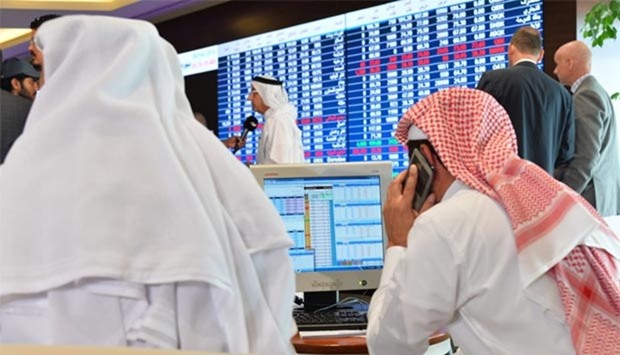Robust demand for banking and financial services stocks however translated into mere 18 points addition in the Qatar Stock Exchange’s main index, thus failing to break the 11,000 mark on Sunday.
Non-Qatari individual investors turned bullish and there was increased net buying by the Gulf institutions, which helped the 20-stock Qatar Share Index gain 0.17% to 10,959.82 points with buying pressure predominantly among large cap equities.
Local retail investors’ weakened net selling pressure also played its part in the bourse, whose year-to-date gains stood at 5.01%.
Islamic stocks were seen gaining slower than the other indices in the market, where domestic institutions’ buying support rather weakened substantially.
Trade turnover and volumes were on the increase in the bourse, where realty and telecom sectors together accounted for more than 70% of the total volumes.
Market capitalisation expanded more than QR2bn or 0.42% to QR588.39bn with large and microcap equities gaining 0.69% and 0.44%, but mid and small caps fell 0.18% and 0.17% respectively.
The Total Return Index gained 0.17% to 17,732.26 points, All Share Index by 0.2% to 3,002.66 points and Al Rayan Islamic Index by 0.14% to 4,082.89 points.
The banks and financial services sector saw its index surge 1.11%, transport (0.13%), consumer goods (0.12%) and telecom (0.05%), whereas insurance fell 1.23%, real estate (0.67%) and industrials (0.28%).
Major gainers included QNB, Doha Bank, Commercial Bank, Vodafone Qatar, Mazaya Qatar, Barwa, United Development Company, Salam International Investment and Widam Food.
Nevertheless, Ooredoo, Ezdan, Aamal Company, Mesaieed Petrochemical Holding, Qatar General and Reinsurance, Alijarah Holding, Qatari Investors Group and Islamic Holding Group saw their stocks lose sheen.
The GCC (Gulf Cooperation Council) institutions’ net buying strengthened to QR32.07mn against QR25.78mn on January 19.
Non-Qatari individual investors turned net buyers to the tune of QR5.24mn compared with net sellers of QR5.29mn last Thursday.
The GCC retail investors were also net buyers to the extent of QR0.74mn against net profit takers of QR4.92mn the previous trading day.
Local retail investors’ net selling declined considerably to QR38.24mn compared to QR57.85mn on January 19.
However, non-Qatari institutions turned net sellers to the tune of QR1.99mn against net buyers of QR2.06mn last Thursday.
Domestic institutions’ net buying weakened substantially to QR2.2mn compared to QR40.22mn the previous trading day.
Total trade volume rose 73% to 12.64mn shares and value by 9% to QR310.17mn, while deals were down 8% to 3,193.
The real estate sector’s trade volume grew almost nine-fold to 5.67mn equities and value by more than seven-fold to QR99.34mn on more than doubled transactions to 835.
The telecom sector’s trade volume more than doubled to 3.23mn stocks and value also more than doubled to QR33.26mn but on 30% decline in deals to 172.
The market witnessed 26% surge in the consumer goods sector’s trade volume to 0.73mm shares and 3% in value to QR50.41mn but on 29% fall in transactions to 449.
However, the industrials sector’s trade volume plummeted 67% to 0.71mn equities, value by 55% to QR28.46mn and deals by 35% to 477.
The transport sector reported 59% plunge in trade volume to 0.26mn stocks, 55% in value to QR8.02mn and 45% in transactions to 121.
The banks and financial services sector’s trade volume shrank 3% to 1.97mn shares, value by 30% to QR86.49mn and deals by 12% to 1,063.
Although the insurance sector’s trade volume was flat at 0.07mn equities, there was 21% shrinkage in value to QR4.19mn but on 7% expansion in transactions to 76.
In the debt market, there was no trading of treasury bills and government bonds.


